| Listing 1 - 10 of 21 | << page >> |
Sort by
|
Book
ISBN: 9781350032095 9781350228061 9781350032118 9781350032101 Year: 2022 Publisher: London Bloomsbury Academic
Abstract | Keywords | Export | Availability | Bookmark
 Loading...
Loading...Choose an application
- Reference Manager
- EndNote
- RefWorks (Direct export to RefWorks)
"Using newly declassified documents from Serbian, British, Indian, Chinese, U.S., and Soviet archives, Non-Aligned Movement Summits shows how the Non-Aligned Movement (NAM) gradually evolved into the third force of Cold War politics, enveloping most of the post-colonial and non-bloc world. Jovan Cavoški follows the evolution of the NAM through its summits and other gatherings, during which major political decisions pertaining to the destiny of the Third World were made. These events were scrutinized by all major powers and had a corresponding effect on their policies. From the Belgrade Conference in 1961 until 1989, all major Third World and non-bloc nations met to demonstrate to the Eastern and Western Blocs that they were independent, active and respected participants in world affairs. Cavoški shows how these summits were also closely related to events occurring in the relationship between the two blocs, providing opportunities for non-bloc actors to influence the global balance of power. By moving the focus of 20th-century international history away from the bloc nations, and instead giving developing nations in Africa and Asia due attention, this book provides a fresh perspective on Cold War history and fills a significant gap in the literature. It is an important study for all students and scholars of the Cold War and international history"--
International groups --- anno 1900-1999 --- Nonalignment --- World politics --- Congresses --- History
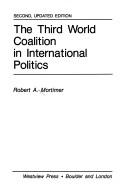
ISBN: 0865317739 9780865317734 Year: 1984 Volume: 2 Publisher: Boulder, Colo.: Westview press,
Abstract | Keywords | Export | Availability | Bookmark
 Loading...
Loading...Choose an application
- Reference Manager
- EndNote
- RefWorks (Direct export to RefWorks)
Multi
ISBN: 9781400858484 9780691609676 0691609675 1400858488 Year: 1987 Publisher: Princeton, New Jersey : Princeton University Press,
Abstract | Keywords | Export | Availability | Bookmark
 Loading...
Loading...Choose an application
- Reference Manager
- EndNote
- RefWorks (Direct export to RefWorks)
Zimmerman asks. 'What difference does it make for Yugoslavia's political evolution that it exists in an international environment as well as a domestic one?" Presenting a lucid analysis of the mutual influence of external and internal factors in Yugoslav politics, he pays special attention to the political significance of the one million Yugoslavs who have crossed the country's borders to work in capitalist Western Europe.Originally published in 1987.The Princeton Legacy Library uses the latest print-on-demand technology to again make available previously out-of-print books from the distinguished backlist of Princeton University Press. These editions preserve the original texts of these important books while presenting them in durable paperback and hardcover editions. The goal of the Princeton Legacy Library is to vastly increase access to the rich scholarly heritage found in the thousands of books published by Princeton University Press since its founding in 1905.
Political sociology --- Politics --- Nonalignment --- Yugoslavia --- Politics and government --- Emigration and immigration --- Government policy.
Book
ISBN: 9780228014652 9780228015802 9780228015819 0228015812 0228015804 0228014654 Year: 2023 Publisher: Montreal, Quebec : McGill-Queen's University Press,
Abstract | Keywords | Export | Availability | Bookmark
 Loading...
Loading...Choose an application
- Reference Manager
- EndNote
- RefWorks (Direct export to RefWorks)
In September 1961, Socialist Yugoslavia formally established a partnership with states in the Global South called the Non-Aligned Movement (NAM). Socialist Yugoslavia and the Non-Aligned Movement understands the NAM as a site for transnational cultural exchange, and explores the movement's decolonial alternatives to global inequalities.
International relations. Foreign policy --- Non-Aligned Movement --- Yugoslavia --- Cold War. --- Nonalignment --- Socialism --- Non-Aligned Movement. --- Foreign relations --- Cold War
Book
ISBN: 0198275749 Year: 1988 Publisher: Oxford
Abstract | Keywords | Export | Availability | Bookmark
 Loading...
Loading...Choose an application
- Reference Manager
- EndNote
- RefWorks (Direct export to RefWorks)
Law of nations: objects and subjects --- International groups --- Europe --- 327.55 --- International relations --- Neutrality --- -#SBIB:327.5H20 --- 327 <1-11+15> --- Neutralism --- Buffer states --- Intervention (International law) --- Isolationism --- Nonalignment --- Prize law --- Region of war --- Unneutral service --- War, Maritime (International law) --- War (International law) --- Coexistence --- Foreign affairs --- Foreign policy --- Foreign relations --- Global governance --- Interdependence of nations --- International affairs --- Peaceful coexistence --- World order --- National security --- Sovereignty --- World politics --- Blokvorming. Neutraliteit. Nonalignment --- Vredesonderzoek: algemeen --- Law and legislation --- International relations. --- 327.55 Blokvorming. Neutraliteit. Nonalignment --- #SBIB:327.5H20
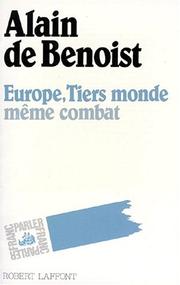
ISBN: 2221042301 9782221042304 Year: 1986 Publisher: Paris: Laffont,
Abstract | Keywords | Export | Availability | Bookmark
 Loading...
Loading...Choose an application
- Reference Manager
- EndNote
- RefWorks (Direct export to RefWorks)
Developing countries --- Europe --- Relations --- 327.55 --- 339.96 --- Blokvorming. Neutraliteit. Nonalignment --- Ontwikkelingshulp. Ontwikkelingssamenwerking. Ontwikkelingsproblematiek --- Developing Countries --- Council of Europe countries --- Eastern Hemisphere --- Eurasia --- Emerging nations --- Fourth World --- Global South --- LDC's --- Least developed countries --- Less developed countries --- Newly industrialized countries --- Newly industrializing countries --- NICs (Newly industrialized countries) --- Third World --- Underdeveloped areas --- Underdeveloped countries --- -Relations --- -327.55 --- 339.96 Ontwikkelingshulp. Ontwikkelingssamenwerking. Ontwikkelingsproblematiek --- 327.55 Blokvorming. Neutraliteit. Nonalignment --- -Developing countries --- Developing countries - Relations - Europe --- Europe - Relations - Developing countries
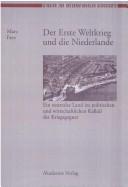
ISBN: 3050032650 3050048123 Year: 1998 Volume: 5 Publisher: Berlin Akademie-Verlag
Abstract | Keywords | Export | Availability | Bookmark
 Loading...
Loading...Choose an application
- Reference Manager
- EndNote
- RefWorks (Direct export to RefWorks)
In der vorliegenden Studie wird der Versuch unternommen, Interdependenzen aufzuzeigen, innerstaatliche und zwischenstaatliche Entwicklungen zu skizzieren und ihre Einflüsse auf die Gestaltung der Außenbeziehungen mehrerer Staaten herauszuarbeiten. Politische, strategische und wirtschaftliche Faktoren werden aufeinander bezogen und im Kontext von Ursache und Wirkung politischer EntScheidungsprozesse interpretiert.
World War, 1914-1918 --- Neutrality --- Neutral trade with belligerents --- War, Maritime (International law) --- War (International law) --- Blockade --- Contraband of war --- Neutralism --- International relations --- Buffer states --- Intervention (International law) --- Isolationism --- Nonalignment --- Prize law --- Region of war --- Unneutral service --- Law and legislation --- Première guerre mondiale --- Netherlands --- Pays-Bas --- Foreign relations --- Foreign economic relations --- Relations extérieures --- Relations économiques extérieures --- anno 1900-1999 --- Germany
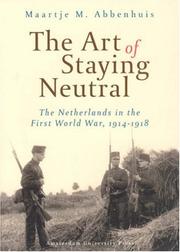
ISBN: 9789053568187 9053568182 9786610958221 9048503930 1280958227 1429454164 9781429454162 9789048503933 9781280958229 661095822X 9790000000000 Year: 2006 Publisher: Amsterdam University Press
Abstract | Keywords | Export | Availability | Bookmark
 Loading...
Loading...Choose an application
- Reference Manager
- EndNote
- RefWorks (Direct export to RefWorks)
The Art of Staying Neutral offers a fascinating insight into the problems and challenges associated with neutrality in an age of 'total war'. It explains how the Netherlands upheld and protected its non-belligerency during the First World War despite constant interference from its warring neighbours. Staying neutral was an artform that the Dutch managed to master through clever diplomacy, conscientious adherence to international laws, comprehensive mobilisation of its armed forces, regular patrols of its territorial boundaries, careful policing of its citizens, and a decisive measure of good fortune. The Art of Staying Neutral makes important contributions to the study of neutrality and the domestic history of the Netherlands in this seminal world event.
History of the Netherlands --- anno 1910-1919 --- Neutrality. --- World War, 1914-1918. --- World War, 1914-1918 --- Neutrality --- History & Archaeology --- History - General --- History --- Netherlands --- Neutralism --- Law and legislation --- International relations --- Buffer states --- Intervention (International law) --- Isolationism --- Nonalignment --- Prize law --- Region of war --- Unneutral service --- War, Maritime (International law) --- War (International law) --- geschiedenis --- history, geography, and auxiliary disciplines
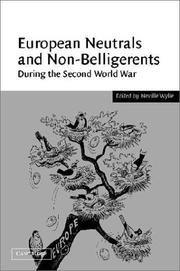
ISBN: 0521643589 052115362X 0511523793 9780511523793 9780521643580 9780521153621 Year: 2002 Publisher: Cambridge Cambridge University Press
Abstract | Keywords | Export | Availability | Bookmark
 Loading...
Loading...Choose an application
- Reference Manager
- EndNote
- RefWorks (Direct export to RefWorks)
This collection provides a comprehensive English-language survey of the conduct of neutral and non-belligerent states during the war. Instead of narrowly focusing on the few neutrals that survived the war intact, the volume broadens our understanding of neutrality, by including chapters on 'non-belligerents' and those neutrals of south-east Europe, such as Romania and Yugoslavia. The essays focus on how individual neutral governments perceived international developments and throw light on the domestic political circumstances that critically affected their response to the course of the war. They therefore provide the political context that has been overlooked in controversies surrounding their humanitarian and financial activities. While based on the authors' own research, the essays draw widely on secondary literature and provide invaluable analytical introductions to the large amount of historical writing on these countries.
History of Europe --- anno 1940-1949 --- Neutrality --- World War, 1939-1945 --- History --- Diplomatic history. --- Arts and Humanities --- Neutralism --- International relations --- Buffer states --- Intervention (International law) --- Isolationism --- Nonalignment --- Prize law --- Region of war --- Unneutral service --- War, Maritime (International law) --- War (International law) --- Law and legislation --- Historiography
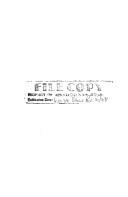
ISBN: 0415005078 Year: 1988 Publisher: London Routledge
Abstract | Keywords | Export | Availability | Bookmark
 Loading...
Loading...Choose an application
- Reference Manager
- EndNote
- RefWorks (Direct export to RefWorks)
Neutrality --- States, Small --- 327.55 --- Nations, Small --- Small countries --- Small nations --- Small states --- Neutralism --- Law and legislation --- International relations. Foreign policy --- Political science --- States, Size of --- Middle powers --- International relations --- Buffer states --- Intervention (International law) --- Isolationism --- Nonalignment --- Prize law --- Region of war --- Unneutral service --- War, Maritime (International law) --- War (International law)
| Listing 1 - 10 of 21 | << page >> |
Sort by
|

 Search
Search Feedback
Feedback About UniCat
About UniCat  Help
Help News
News